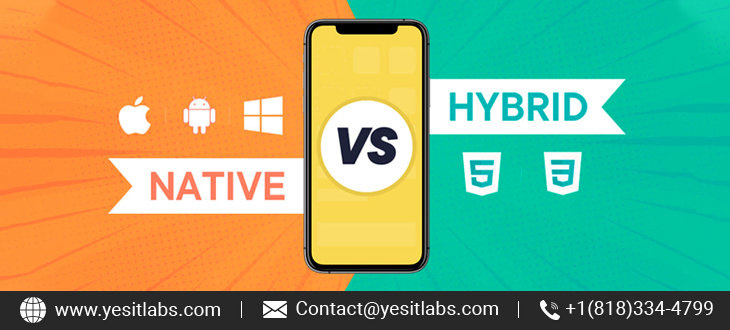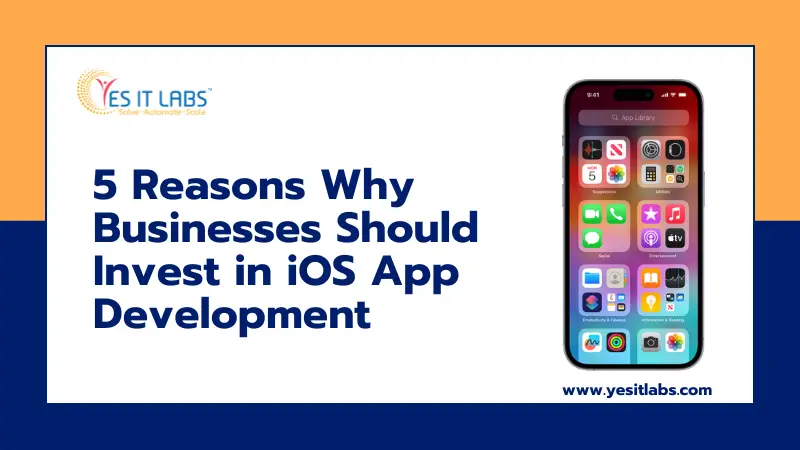

Native Mobile App Development vs Hybrid App Development. What You Should Choose for Your Next Project?
Whenever someone plans to build a mobile application, they face the choice “native vs hybrid app” and most importantly they are looking for efficient ways to implement the idea.
When it comes to deciding between native and hybrid app development, the debate over which is more profitable in never-ending. There are two main mobile app types native, and hybrid one can explore for their mobile app development project. All development paths hold inherent value, but the question arises which approach is right for your project?
YES IT Labs is a Mobile App Development company that provides you with the complete solution.Depending on your overall product goals and business objectives, this decision can make or break the success of your project strategy. A variety of factors for consideration are involved while deciding to build your mobile product as either a native or hybrid app.
In this article, you will study what is the difference between the native app and hybrid app, find out their pros and cons, and how it affects the overall development process and app performance.
Native vs. hybrid app: What’s the difference?
Talking about the difference between native and hybrid apps the first thing to mention is that the native ones are developed for a definite platform like iOS or Android. Digging more into technical traits we get to know that native apps are built with programming languages that are officially supported by the platform. For Android, those languages are Kotlin and Java, whereas for iOS Objective-C and Swift.
What about hybrid apps? They are created with the help of web technologies like HTML, JavaScript, and CSS that are combined. So, hybrid apps are websites put into a native app to look and behave just like them. However, hybrid apps edge cross-platform capabilities and use one code base to cover multiple platforms on the conflict to native applications.
There is kind of a mess when it comes to explaining what is a hybrid app, what is a cross-platform app, and how these two variables. Truly, they are quite similar to each other but have one slight difference. During the cross-platform app development, programmers can make use of both web technologies. Hybrid app frameworks like Ionic and Xamarin Make this possible and provide developers with more potential when building apps. Apart from this, they are identical and the term ‘hybrid app’ is applicable for both these notions.
So, what do we have? Native apps are created specifically for one platform, while hybrid apps can function across multiple platforms and perform much better despite they’re websites at the core.
Native Mobile App development company providesNative applications that are developed to perform a particular task on a specific mobile platform. Tools (SDK) are used by developers to build native apps only for certain frameworks, hardware, or operating systems. For example, a native app for Android is made with Kotlin using Android SDK. For creating an iOS app, developers mostly use Swift with the iOS SDK.
On the other hand, Hybrid Mobile App development company provides Hybrid Apps built with web technologies like JavaScript, React, Dart, HTML, and CSS. With special plugins, a hybrid app can access all the native platform features and offers similar performance to a native app.
If you wish to make a native app for both Android and iOS, you would like to develop two code bases. Hybrid apps can be theoretically developed for any platform from a single code base is the biggest difference between native app vs. hybrid app.
Guide for Choosing Between Native and Hybrid App Development
Once you analyze the information above, you’re likely to reach many needs for your project which may include;
You choose a native mobile application if :
- Your application needs to be able to work offline as well as online
- You want the application to be Responsive.
- The application needs free access to services and resources on the device
- They use the smallest amount of hardware due to efficient coding.
- They can access native device functionalities to complement the experience.
- They can use push notifications to increase the app’s use and encourage specific paths and goals within the app.
You choose a hybrid mobile application if:
- The app doesn’t require complex animation or calculations
- Whatever hardware the device offers, the app should make use of it also.
- You already have a website and want to build an app in a short time and for the lowest price.
- They are much quicker to develop because most development is completed using standard web technologies.
- Building on one base saves resources because developing a single codebase only requires one team and takes less time.
- They make updates easier to make and deploy.
Summary
The outcome is that they are both the best of the best. The success of one native app does not detract from the merits of hybrid development, because for some other product hybrid may be the backer of success. However, no matter the architecture you select, we are there to assist you.
YES IT Labs ( Native Mobile App development company and Hybrid App development company) will help you make the right choice between native vs hybrid development. Contact us and we will help you figure out not only the correct mobile app developing approach but also thoroughly plan your product strategy to the very last development stage.

























